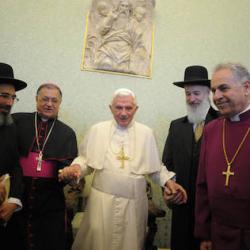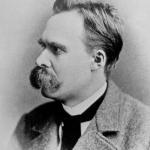Carl Trueman’s review of The End of Protestantism was published in the December 2016 issue of First Things. It’s a fair but critical review, and gives much fuel for further discussion. Here I respond to two main points.
First and most extensively: Carl says that I am “unpersuasive” about the way forward toward unity. He quotes a passage in which I describe the cross-fertilization of Christian traditions that is already taking place and will, I hope, continue. He comments, “One of Isaiah Berlin’s arguments against utopianism was that utopias, like four-sided triangles, cannot exist even at the level of theory. The same is true for a reformed, united Church described in the terms above.”
My response to the “utopian charge” is simple-minded: Jesus prayed for unity among His disciples, a unity that resembles the perichoretic unity of the Father and Son. The Father gives Jesus what He wants, and so that’s the kind of unity the church will have. It’s not what we have now. That much is, I trust, undeniable (Carl doesn’t deny it). It’s a church we hope for. To trust that Jesus will achieve what He wants isn’t utopian. It’s faith in the Father’s goodness and the power of the Spirit of Jesus.
Carl goes on to explain why my “utopian” vision is a square circle: “First, there is the obvious point that the theological canon here seems open-ended. How is ‘the whole of the tradition’ to be defined or regulated? Second, even among those that are specifically mentioned, there are going to be obvious contradictions. When Trent and Westminster contradict each other, who wins?”A bit later, he adds: “once you move beyond that bare minimum, you need to address the tensions and ultimately the contradictions that exist between the major confessional traditions of Christianity, to say nothing of the many smaller splinters. Leithart never addresses this issue.”
First of all, I must protest the final claim, which Carl repeatedly implies in the latter half of his review. Carl may not like the way I address the issue; he may think my treatment inadequate. But I addressed precisely this question in the book (pp. 172-178). Besides, a central point of my critique of denominationalism is that denominations allow us to avoid the tensions and contradictions by ensuring that we have little serious contact with differing viewpoints.
Along similar lines, Carl refuses to “regard the things that are most fundamental to their church’s testimony as of comparatively little consequence.” He doesn’t exactly say that I regard doctrinal distinctives as things “of comparatively little consequence,” but a reader of the review might draw that inference. But I made exactly Carl’s point on page 173: doctrinal differences cannot be “overcome by ignoring doctrinal differences, loosening doctrinal commitments, treating doctrine as an optional extra, or pretending that truth does not matter. Doctrines have mattered and do matter; they have mattered enough for people to kill and die for them. Many have believed the gospel is at stake in their formulations, and it will not do simply to assert the contrary.” It’s true that I don’t think the distinctives of different doctrinal traditions to be of ultimate consequence, but there’s a fair bit of open space between “not ultimate” and “comparatively little.”
But these are quibbles by comparison to the main point: Carl’s points about the limits of the tradition and the impasses of theology aren’t objections to seeking unity; they are part of the project of union. At this moment in time, of course, the church doesn’t have a consensus about what ought and oughtn’t be retained from the Christian tradition; that is one of the many, many points to fight through in prayer and charitable debate. And the same goes with Trent and Westminster. But by what calculus do we determine that today’s lack of consensus will last forever? By what theologic do we conclude that today’s impasses are fixed forever?
Carl doesn’t consider the possibility that neither Trent nor Westminster will win. He doesn’t consider the possibility that Roman Catholics and Protestants might prayerfully hit on formulations of disputed points that satisfy everyone. He doesn’t consider the possibility that we can move toward consensus with integrity. Before the utopian charge comes back again, let me note that this has actually happened, in, for instance, the Lutheran-Catholic Joint Declaration on the Doctrine of Justification. As each side enters a debate with the assumption that their opponents are neither villains nor fools, they must be able to find ways to move toward one mind on even the most contentious points of doctrine. And that must isn’t utopian either. It’s a pneumatological must—it must be possible because we who receive the same Spirit have the mind of the one Christ.
Second and more briefly: Carl isn’t sure why I’m not Roman Catholic, and claims that the reasons I give for remaining Protestant are not Protestant reasons. I’m not persuaded that my reasons are unProtestant. My question is: Are they biblical? If they are, aren’t they ipso facto Protestant? Surely something cannot be biblical and unProtestant.
In any case, Carl is wrong to assume that the reasons I give in the book are my only reasons for not becoming Roman Catholic. I have all the old Protestant reasons (as I’ve explained here and here). My reasons range from opposition to Roman Catholic Marian and Papal doctrines to forms of liturgical idolatry to the fear that my staunch Lutheran mother would spin in her grave. The reasons I presented in the book were the reasons most relevant to the topic of the book.
So I have the same question that Carl has: Given our deep differences, how can Protestants and Roman Catholics ever unite? I have no earthly idea. But I’m confident that the church isn’t confined to earthly ideas.















